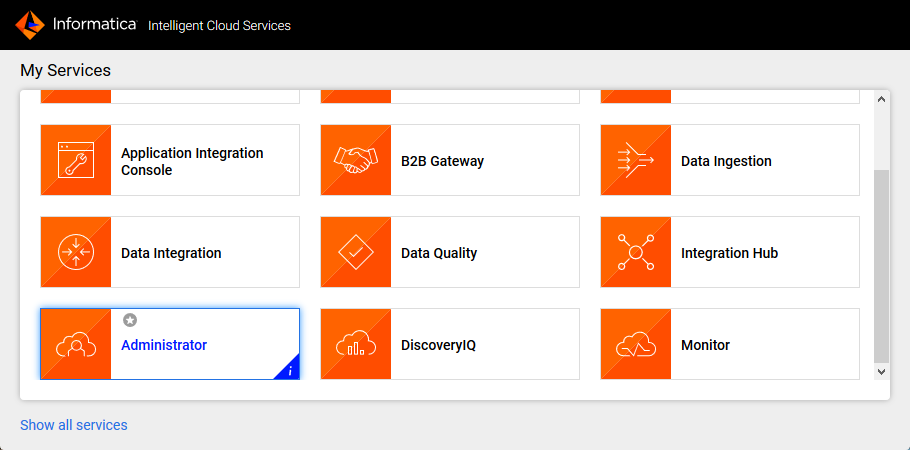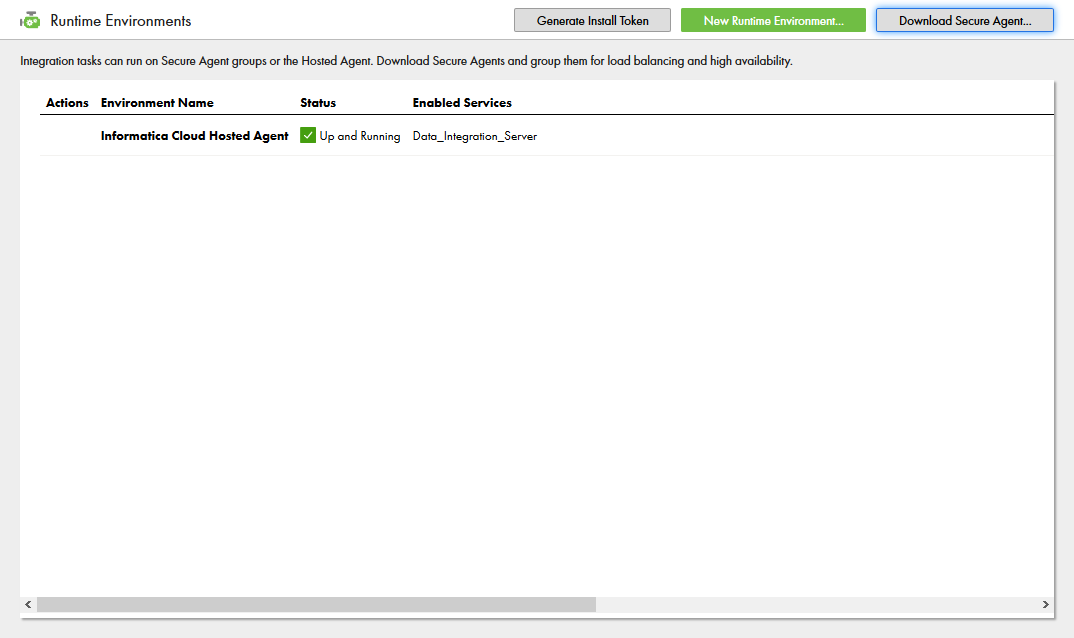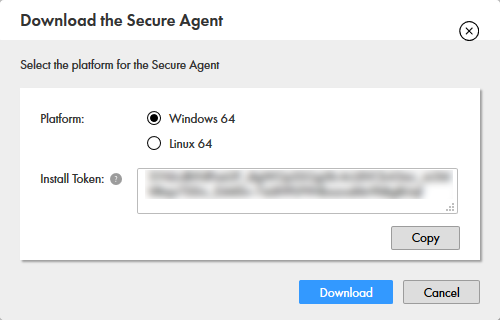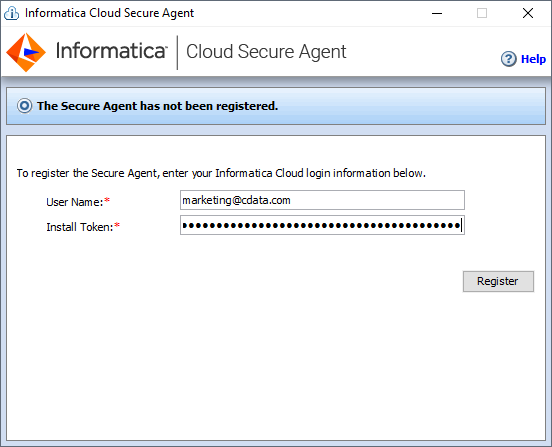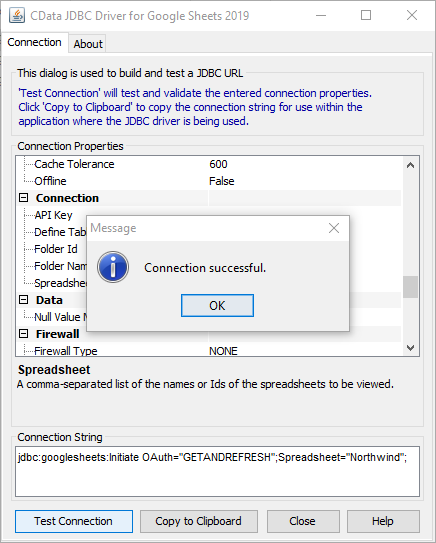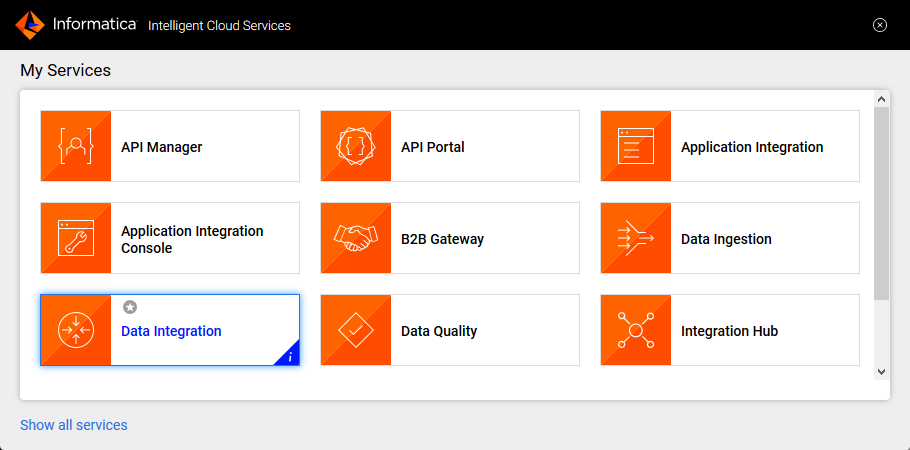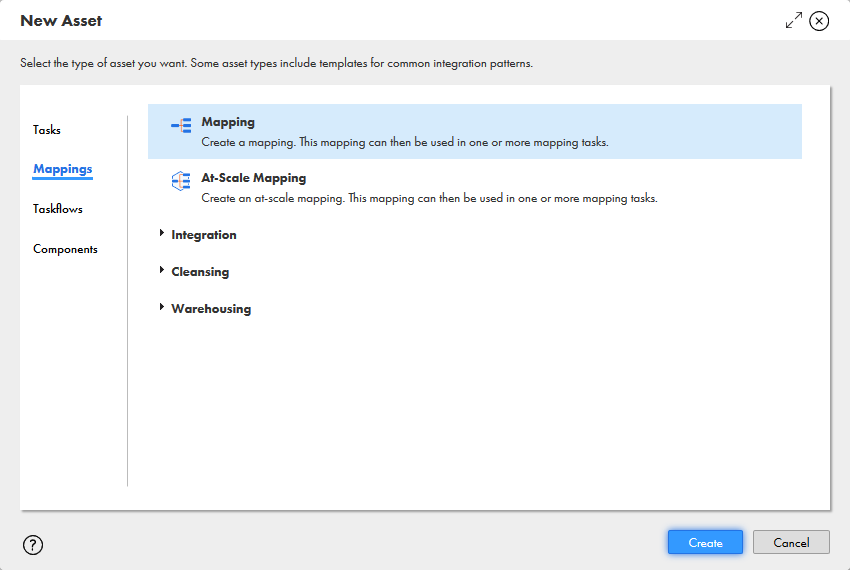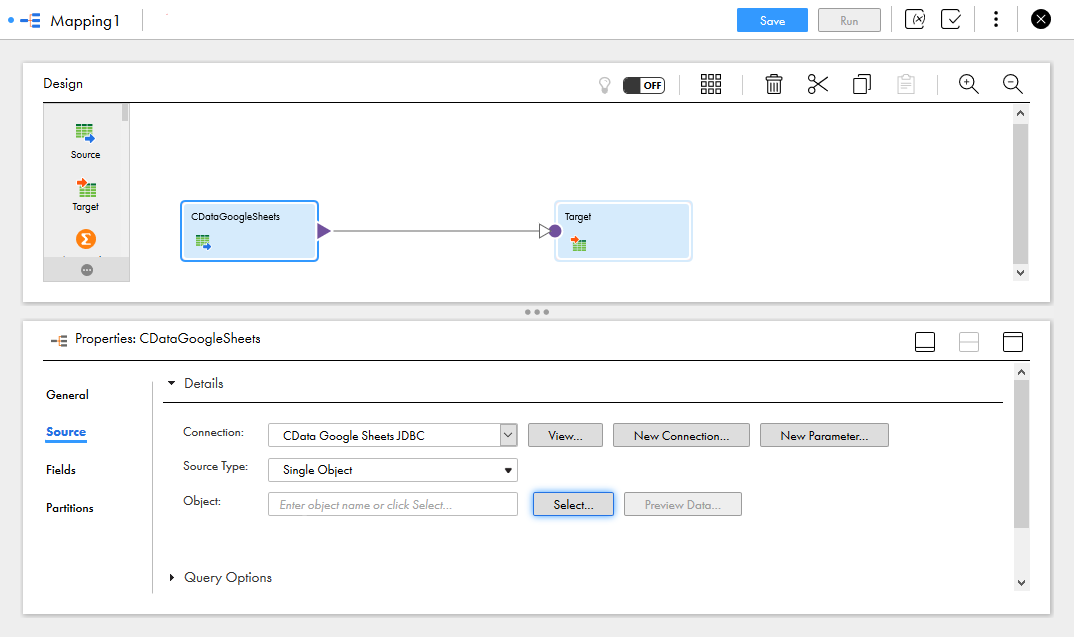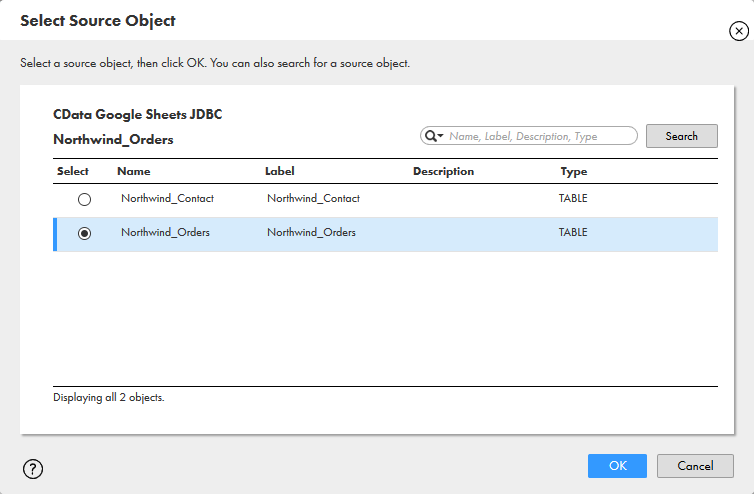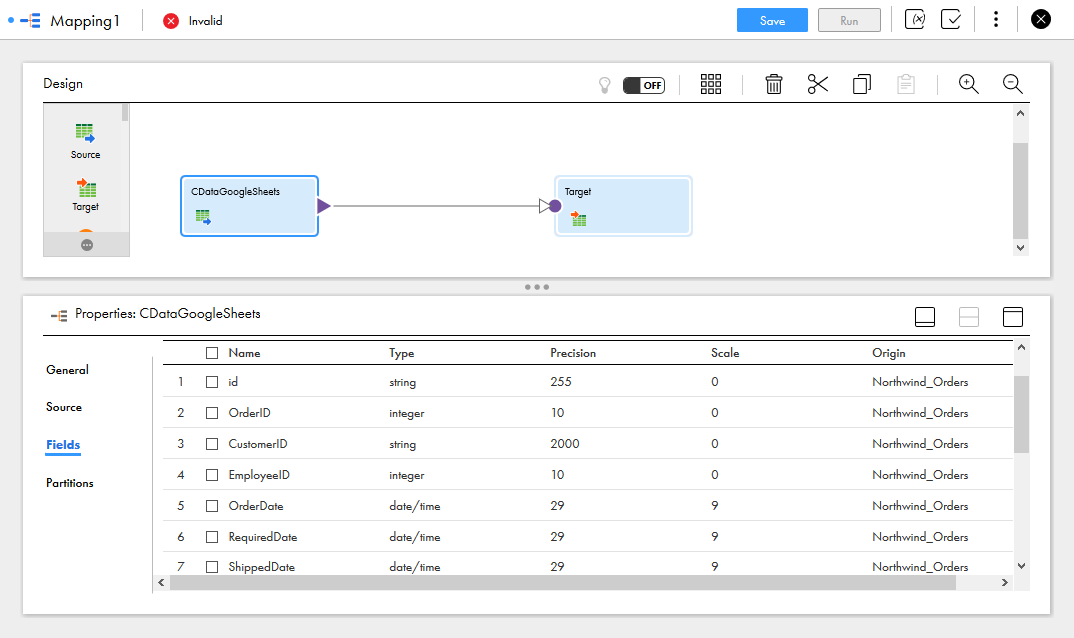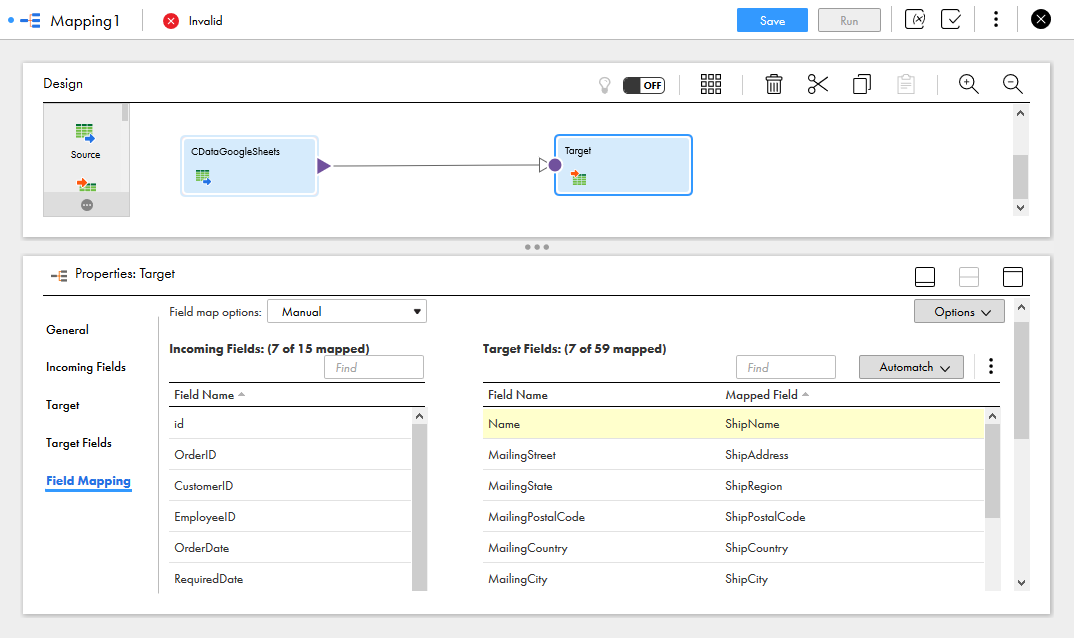Discover how a bimodal integration strategy can address the major data management challenges facing your organization today.
Get the Report →Integrate Dynamics 365 Data in Your Informatica Cloud Instance
Use CData JDBC drivers with the Informatica Cloud Secure Agent to access live Dynamics 365 data from Informatica Cloud.
Informatica Cloud allows you to perform extract, transform, and load (ETL) tasks in the cloud. With the Cloud Secure Agent and the CData JDBC Driver for Dynamics 365, you get live access to Dynamics 365 data, directly within Informatica Cloud. In this article, we will walk through downloading and registering the Cloud Secure Agent, connecting to Dynamics 365 through the JDBC Driver and generating a mapping that can be used in any Informatica Cloud process.
About Dynamics 365 Data Integration
CData simplifies access and integration of live Microsoft Dynamics 365 data. Our customers leverage CData connectivity to:
- Read and write data in the full Dynamics 365 ecosystem: Sales, Customer Service, Finance & Operations, Marketing, and more.
- Extend the native features of Dynamics CRM with customizable caching and intelligent query aggregation and separation.
- Authenticate securely with Dynamics 365 in a variety of ways, including Azure Active Directory, Azure Managed Service Identity credentials, and Azure Service Principal using either a client secret or a certificate.
- Use SQL stored procedures to manage their Dynamics 365 entities - listing, creating, and removing associations between entities.
CData customers use our Dynamics 365 connectivity solutions for a variety of reasons, whether they're looking to replicate their data into a data warehouse (alongside other data sources)or analyze live Dynamics 365 data from their preferred data tools inside the Microsoft ecosystem (Power BI, Excel, etc.) or with external tools (Tableau, Looker, etc.).
Getting Started
Informatica Cloud Secure Agent
To work with the Dynamics 365 data through the JDBC Driver, install the Cloud Secure Agent.
- Navigate to the Administrator page in Informatica Cloud
![]()
- Select the Runtime Environments tab
- Click "Download Secure Agent"
![]()
- Make note of the Install Token
![]()
- Run the installer on the client machine and register the Cloud Secure Agent with your username and install token
![]()
NOTE: It may take some time for all of the Cloud Secure Agent services to get up and running.
Connecting to the Dynamics 365 JDBC Driver
With the Cloud Secure Agent installed and running, you are ready to connect to Dynamics 365 through the JDBC Driver.
Adding the JDBC Driver to the Secure Agent Machine
- Navigate to the following directory on the Secure Agent machine:
%Secure Agent installation directory%/ext/connectors/thirdparty/ - Create a folder and add the driver JAR file (cdata.jdbc.dynamics365.jar) based on the type of mapping that you want to configure.
For mappings, create the following folder and add the driver JAR file:
informatica.jdbc_v2/commonFor mappings in advanced mode, also create the following folder and add the driver JAR file:
informatica.jdbc_v2/spark - Restart the Secure Agent.
Connecting to Dynamics 365 in Informatica Cloud
After installing the driver JAR file, you are ready to configure your connection to Dynamics 365 in Informatica Cloud. Start by clicking the Connections tab and clicking New Connection. Fill in the following properties for the connection:- Connection Name: Name your connection (i.e.: CData Dynamics 365 Connection)
- Type: Select "JDBC_V2"
- Runtime Environment: Select the runtime environment where you installed the Secure Agent
- JDBC Driver Class Name: The name of the JDBC driver class: cdata.jdbc.dynamics365.Dynamics365Driver
- JDBC Connection URL: Set this to the JDBC URL for Dynamics 365. Your URL will look similar to the following:
jdbc:dynamics365:OrganizationUrl=https://myaccount.operations.dynamics.com/;Edition=Sales;InitiateOAuth=GETANDREFRESH;Edition and OrganizationUrl are required connection properties. The Dynamics 365 connector supports connecting to the following editions: CustomerService, FieldService, FinOpsOnline, FinOpsOnPremise, HumanResources, Marketing, ProjectOperations and Sales.
For Dynamics 365 Business Central, use the separate Dynamics 365 Business Central driver.
OrganizationUrl is the URL to your Dynamics 365 organization. For instance, https://orgcb42e1d0.crm.dynamics.com
Built-In Connection String Designer
For assistance in constructing the JDBC URL, use the connection string designer built into the Dynamics 365 JDBC Driver. Either double-click the .jar file or execute the .jar file from the command-line.
java -jar cdata.jdbc.dynamics365.jarFill in the connection properties and copy the connection string to the clipboard.
![Using the built-in connection string designer to generate a JDBC URL (Google Sheets is shown.)]()
- Username: Set this to a placeholder value (since Dynamics 365 does not require a username)
- Password: Set this to a placeholder value (since Dynamics 365 does not require a password)
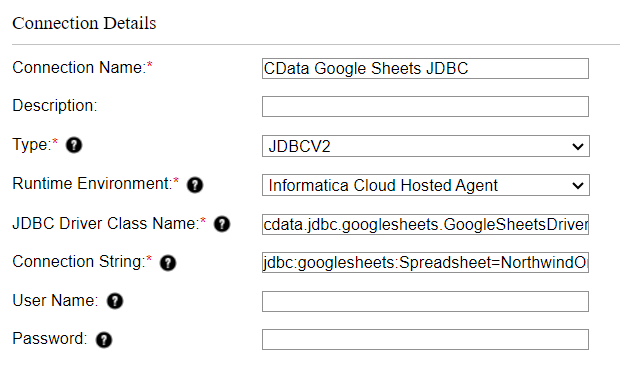
Create a Mapping for Dynamics 365 Data
With the connection to Dynamics 365 configured, we can now access Dynamics 365 data in any Informatica process. The steps below walk through creating a mapping for Dynamics 365 to another data target.
- Navigate to the Data Integration page
![]()
- Click New.. and select Mapping from the Mappings tab
![]()
- Click the Source Object and in the Source tab, select the Connection and set the Source Type
![Selecting the Source Connection and Source Type]()
- Click "Select" to choose the table to map
![Selecting the Source Object]()
- In the Fields tab, select the fields from the Dynamics 365 table to map
![Selecting Source Fields to map]()
- Click the Target object and configure the Target source, table and fields. In the Field Mapping tab, map the source fields to the target fields.
![Selecting the Target Field Mappings]()
With the mapping configured, you are ready to start integrating live Dynamics 365 data with any of the supported connections in Informatica Cloud. Download a free, 30-day trial of the CData JDBC Driver for Dynamics 365 and start working with your live Dynamics 365 data in Informatica Cloud today.





